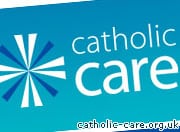England’s last remaining Roman Catholic adoption agency is taking its long-running legal battle into its eighth stage.
It is fighting to preserve its religious ethos by providing adoption services to married couples, but it is threatened by discrimination laws on sexual orientation.
In April the Charity Tribunal ruled that Catholic Care must be willing to provide adoption services to homosexual couples.
Support
But now its lawyers say the ruling contains several errors of law and it has lodged an appeal.
Of the eleven Roman Catholic adoption agencies operating in England and Wales in 2007, Catholic Care is the only one which has not yet closed down or dropped its religious ethos because of sexual orientation laws.
It has received hundreds of letters expressing support for its position, Benjamin James from legal group Bircham Dyson Bell said.
Mr James added that Catholic Care believed it was right to appeal again because of a number of problems in April’s ruling. If the request for an appeal is successful the case will be in its eighth stage.
Thought
He commented that the charity’s trustees had given a lot of thought to the cost involved.
“They are very conscious of the charity’s money and of the work they do with children”, Mr James commented. But having spoken to financial supporters, the trustees “realised they won’t have any money to do anything with children if they let this go”, Mr James said.
Responding to the April ruling, the Roman Catholic Bishop of Leeds Arthur Roche said the charity was “very disappointed”.
He continued: “It is unfortunate that those who will suffer as a consequence of this ruling will be the most vulnerable children for whom Catholic Care has provided an excellent service for many years.”
Marriage
Catholic Care upholds the Roman Catholic Church’s teaching on marriage when placing children for adoption with couples.
But opponents of the policy claim it is acting unlawfully by not considering homosexual couples.
However, the law gives some charities the right to restrict their services to one sexual orientation group. A charity can do this if it is attempting to act within its stated aims as set out in its trust deed.

